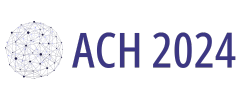The ACH 2024 planning committee ACH strives to ensure that the conference is accessible for all participants.
All synchronous sessions will make live transcription available to participants, and keynote sessions will include both sign language interpretation and live transcription.
Virtual Presentation Accessibility Guidelines
Preparing Slides
- We encourage participants to use the Accessibility Checker in PowerPoint or Accessibility Checker for Google Slides when preparing slides.
- We encourage participants to use an accessible slide template for PowerPoint or one of the built-in themes in Google Slides.
- When adding a new slide in your selected theme, use one of the available layouts, rather than editing them or creating a new layout. This will assist screen readers with your content.
- Pay attention to color contrast: dark text on a light background or light text on a dark background is easiest to read.
- Avoid animations or transitions, which can trip up screen readers.
- Title each slide.
- Set the reading order for content on PowerPoint slides and run the Accessibility Checker to ensure screen readers are reading in the correct order.
- Add alt-text to images that aren’t purely descriptive (instructions for PowerPoint; Google Slides will prompt for alt-text when you upload media).
- Use a sans-serif font, a minimum of 12-pt (18 is better). In the following order, the most accessible fonts are: Arial, Calibri, Century Gothic, Helvetica, Tahoma, and Verdana.
- Use bolded text sparingly for emphasis (not italics of uppercase).
- Use meaningful link text for hyperlinks and short URLs (e.g., tinyurl.com allows you to customize short links).
Giving Your Talk
- Practice your presentation to ensure you are pacing yourself. Speak more slowly than you think you need. Ensure that your presentation fits within the stated limits (12-15 minutes for papers, 5 minutes for lightning talks).
- Speak clearly and minimize background noise.
- Summarize the text on your slides.
- If you are sharing an important image, such as a chart or graph, verbally describe the important information that images shows (e.g., what the data shows, axes titles).
- If showing video, ensure that the video is close captioned and that captions are turned on when you play it.
- If you are comfortably sharing your slides, add the file to the chat or drop a link to your Google Slides.
Adapted from Syone’s “Best Practices for Accessibility at Virtual Events” and Electronic Resources and Libraries’ “Virtual Presentation Accessibility Guidelines.”
Please do not hesitate to contact the conference committee at conference [at] ach [dot] org with any questions or concerns.
Licensing
When submitting a proposal, authors will be prompted to review our Creative Commons Transfer Terms and Licensing statement:
So that my submission can be shared with reviewers and researchers, and my peer-reviewed abstract can be included in conference materials, I (Author) accept the following license: https://creativecommons.org/licenses/by/4.0/.
Creative Commons-Attribution 4.0 (CC-BY 4.0) is a widely used public license that meets the definition of Open Access. Licensing your abstract under this License makes it easy to re-use for the whole community. Please be informed that the License allows commercial use of your abstract as well as making derivative works. However, it guarantees that you are mentioned as the author of the abstract every time someone uses it.
For ACH 2024, this license will be used as follows:
- Accepted proposals will be revised by authors and published in the online program along with their names and affiliations;
- In lieu of a Book of Abstracts, revised abstracts will also be deposited in Humanities CORE, where they will be preserved and given a digital object identifier (DOI). Additionally, conference participants are strongly encouraged to deposit their presentations—whether in the form of a paper, slides, poster, or other format—to CORE, and to share them with the ACH 2023 group on the Commons, in order to facilitate ongoing discussion and citation of your work.
Materials deposited in CORE will be governed by the Humanities Commons Terms of Service, about which more information can be found in the CORE FAQ.
